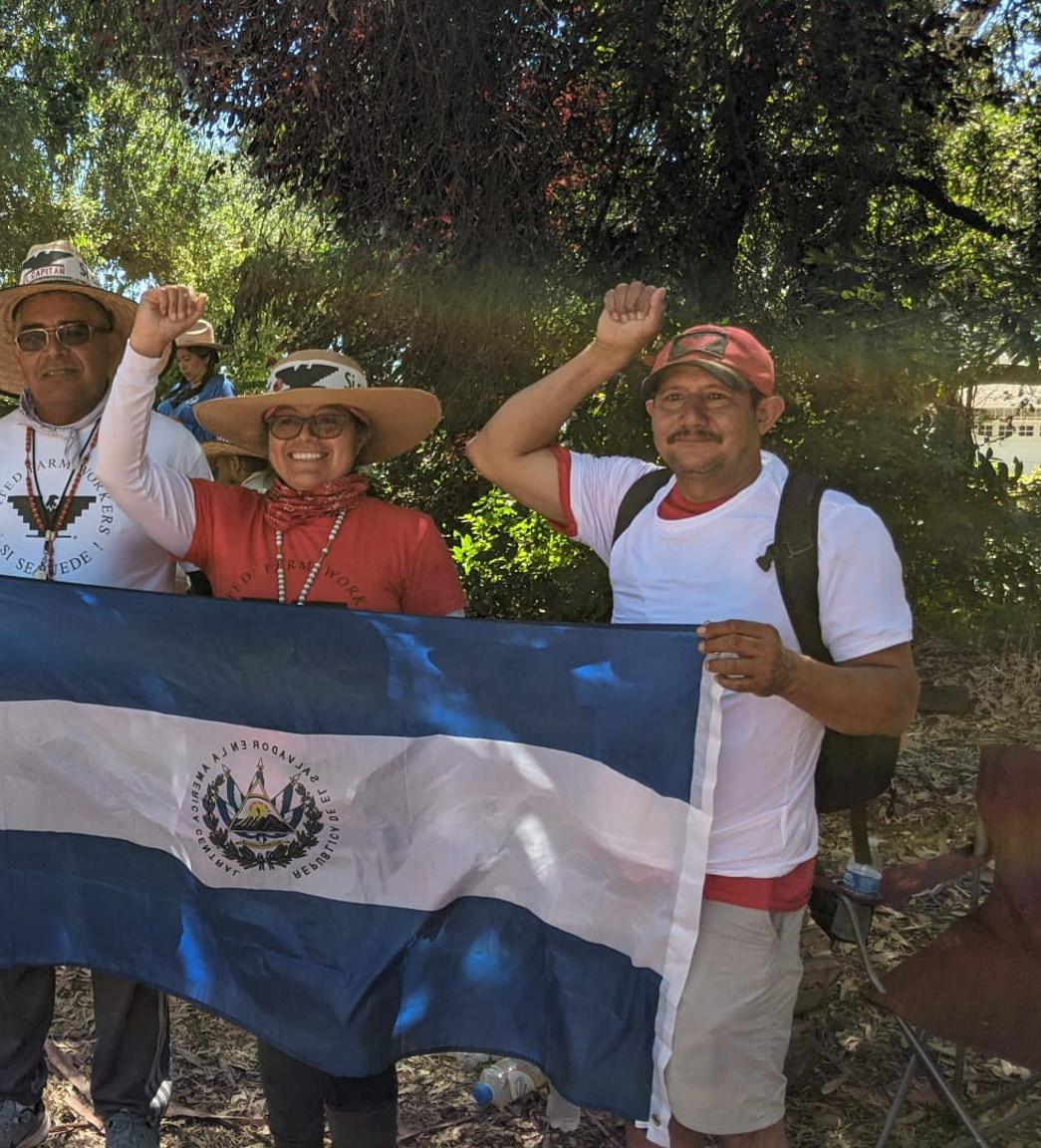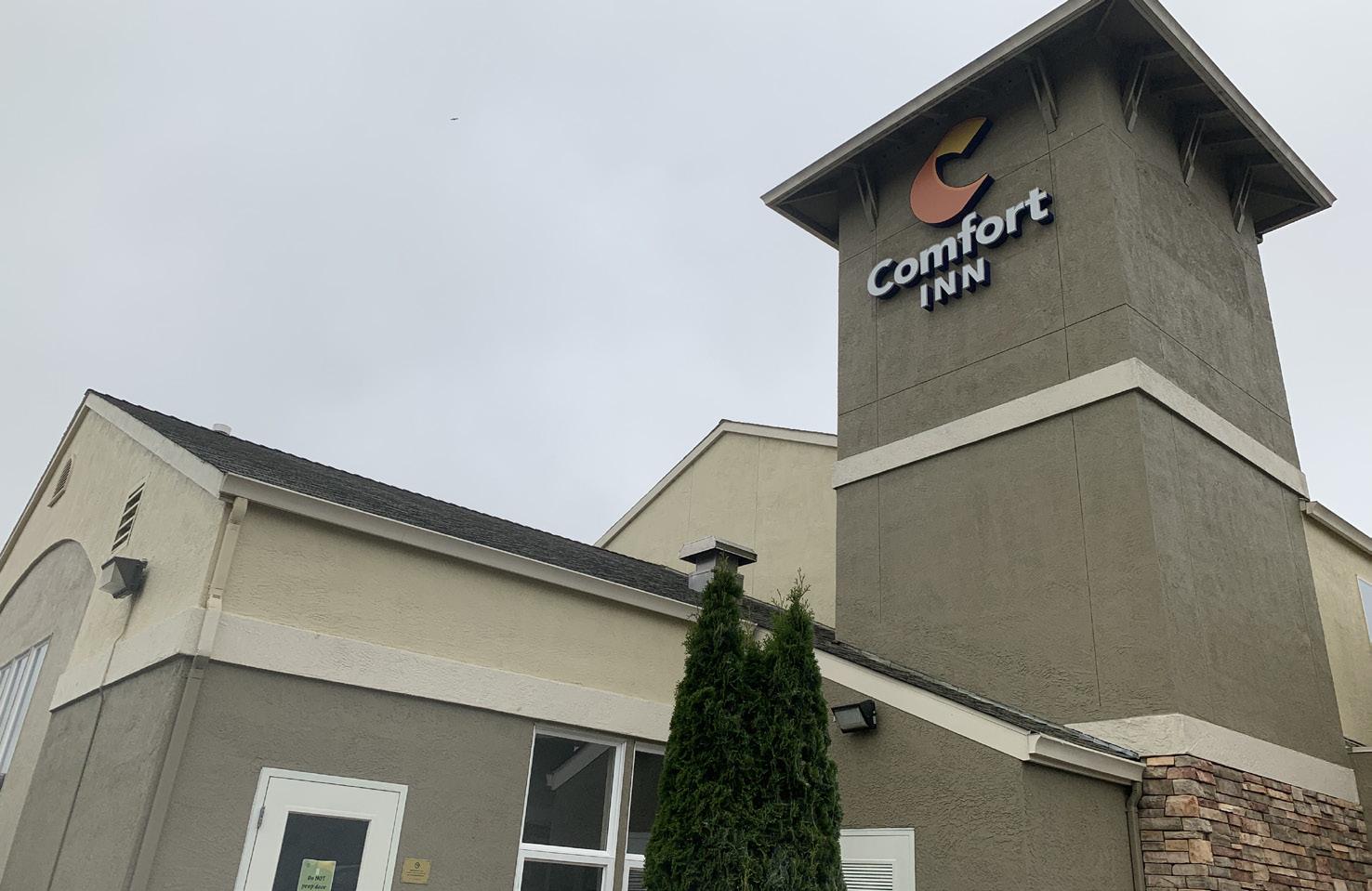
8 minute read
New CRGS professor
from September 2022
by El Leñador
News Noticias
New CRGS professor Roberto Mónico
Advertisement
by Celeste Sadler
Nuevo profesor para el departamento de CRGS
por Celeste Sadler traducido por Sandy Ceja
Roberto Mónico is a new assistant professor this fall in the Department of Critical Race, Gender and Sexuality Studies at Cal Poly Humboldt. He is one of many recently hired faculty and has been teaching for the past four years. This semester he’s teaching ES 105: Intro to U.S. Ethnic Studies and CRGS 390: Theories and Methods. Next spring he will be teaching ES 105 again and ES 308: Multi-Ethnic Resistance (U.S.).
Mónico was born and raised in Los Angeles and is the youngest of four in a Salvadoran family. He grew up as a teenager in West Hollywood during a time period of subcultures and heightened policing.
“I remember being pulled over twice in one day, two separate times four or five hours apart when I was growing up and then I internalized this— thinking that this is just the way it is,” Mónico said. “You don't question it. You just think that this is how it is growing up in LA. When I finally went back to school, I went back to LA community college and then I transferred to UC Berkeley as an undergrad. I was a nontraditional student. I was in my thirties and then, it was very serendipitous, I met a lot of people from communities that were hyper policed and that had spent long times in prison.”
Mónico has a doctorate in comparative enthnic studies from the University of Colorado Boulder with an emphasis in critical race theory and carceral studies. Mónico’s research specifically focuses on the criminalization of African Americans and people of Mexican descent from the LAPD during the 1950s-60s. He also looks at how the prison industrial complex affects Black and Brown communities as a whole, not just the inmates but also their families.
“Liberty in the sense of trying to discover where one’s place was at the height of graffiti was taking off, hip hop had just exploded—- coupled with the heightened police,” Mónico said.
That is how Mónico described growing up in LA during a time period of high policing. Growing up experiencing hyper policing and then going to college and meeting other people who had been hyperpolicied or had been formerly incarcerated led Mónico to researching this topic. It’s this expertise that will make him instrumental to the future Pelican Bay Project.
The Pelican Bay Project is a plan in which Cal Poly Humboldt will offer bachelor’s degrees to people incarcerated in Pelican Bay State Prison in Crescent City, California. The plan is for Mónico to work closely with this project. He will also be working with Project Rebound which offers higher education to formerly incarcerated peoples. “His research includes legal policy, law enforcement history, and the prison industrial complex, so he's really really dedicated to supporting people who have endured hyper policing and the prison industrial complex,” said
Professor Ramona Bell, chair of the
CRGS department. “He's worked with the Underground Scholars Initiative,
California Prison Focus, the Prison Activist Resource Center. So we're really looking forward to his expertise.” Mónico would like his students to know that one of the things his classroom is about is community building and expressing thought. He is going to have students answer questions with the hope that they build off of each other's answers. Mónico wants students to do as much as they can to speak up.
“What’s important is once you leave my classroom after 16 weeks, I want you to be a critical thinker,” Mónico said. “Not only with ethnic studies but just how you view the world.” Roberto Mónico es un nuevo profesor asistente este otoño en el Departamento de Estudios Críticos de Raza, Género y Sexualidad en Cal Poly Humboldt. Es uno de los muchos profesores contratados recientemente y ha estado enseñando durante los últimos cuatro años. Este semestre está enseñando ES 105: Introducción a los estudios étnicos estadounidenses y CRGS 390:Teorías y métodos. La próxima primavera volverá a enseñar ES 105 y ES 308: Resistencia multiétnica (EE. UU.).
Mónico nació y creció en Los Ángeles y es el menor de cuatro en una familia salvadoreña. Creció como adolescente en West Hollywood durante un período de tiempo de subculturas y vigilancia policial intensificada.
“Recuerdo que me detuvieron dos veces en un día, dos veces separadas con cuatro o cinco horas de diferencia cuando estaba creciendo y luego internalicé esto, pensando que así son las cosas”, dijo Mónico. “No lo cuestionas. Solo piensas que así es como es crecer en Los Ángeles. Cuando finalmente regresé a la escuela, volví a la universidad comunitaria de Los Ángeles y luego me transfirieron a UC Berkeley como estudiante universitario. Yo no era un estudiante tradicional. Tenía treinta y tantos años y luego, fue muy fortuito, conocí a muchas personas de comunidades que estaban vigilados por la policía y que habían pasado mucho tiempo en prisión”.
Mónico tiene un doctorado en étnicos de la Universidad de Colorado Boulder con énfasis en teoría crítica de la raza y estudios
carcelarios. La investigación de Mónico se centra específicamente en la criminalización de los afroamericanos y las personas de ascendencia mexicana por parte del Departamento de Policía de Los Ángeles durante las décadas de 1950 y 1960. También analiza cómo el complejo industrial de la prisión afecta a las comunidades negras y latinas en su conjunto, no solo a los reclusos sino también a sus familias. “La libertad en el sentido de tratar de descubrir dónde estaba el lugar de uno a la altura del graffiti estaba despegando, el hip hop acababa de explotar, junto con la policía aumentada”, dijo Mónico. Así describió Mónico crecer en Los Ángeles durante un período de alta vigilancia. Crecer con la experiencia de la vigilancia y luego ir a la universidad y conocer a otras personas que habían sido vigilados o que habían estado encarceladas anteriormente llevó a Mónico a investigar este tema. Es esta experiencia la que lo hará fundamental para el futuro Proyecto Pelican Bay. El Proyecto Pelican Bay es un plan en el que Cal Poly Humboldt ofrecerá títulos de licenciatura a personas encarceladas en la prisión estatal de Pelican Bay en Crescent City, California. El plan es que Mónico trabaje de cerca con este proyecto. También trabajará con Project Rebound, que ofrece Roberto Mónico is one of many new hired professors'. | Photo by/por Celeste Sadler educación superior a personas anteriormente encarceladas. “Su investigación incluye política legal, historia de la aplicación de la ley y el com-
“What’s plejo industrial penitenciario, por lo que realmente se dedica a apoyar a las personas que important is han sido vigilados y el complejo industrial penitenciario”, dijo la profesora Ramona once you leave Bell, presidenta del departamento CRGS. “Ha trabajado con Underground Scholars my classroom Initiative, California Prison Focus, y el Prison Activist Resource Center. Así que esafter 16 weeks, I tamos ansiosos por conocer su experiencia”. A Mónico le gustaría que sus alumnos want you to be a supieran que una de las cosas de las que trata su salón de clases es la construcción de critical thinker,” comunidad y la expresión del pensamiento. Él va a hacer que los estudiantes respondan preguntas con la esperanza de que se basen
Roberto Mónico , en las respuestas de los demás. Mónico qui-
CRGS Professor ere que los estudiantes hagan todo lo posible para hablar. “Lo importante es que una vez que salgas de mi salón de clases después de 16 semanas, quiero que pienses críticamente”, dijo Mónico. “No solo con los estudios étnicos, sino también con la forma en que ves el mundo”.
ADPIC seeks staffing for cultural center
by Peyton Leone
Laughter and paper lanterns hung in the hallway outside of Cal Poly Humboldt's newest cultural center, Asian, Desi, and Pacific Islander Collective Students sat in chairs around the room and played a drawing game on their phones and tablets. ADPIC lead Alyssa Huynh sat at the welcome desk and greeted people as they entered, encouraging them to join in the communal game.
Huynh explained that the group started as a club with weekly meetings. They want to preserve the original community feeling into the cultural center and provide that space to more students. "We still meet weekly and we do meetings like this,"Huynh said. "So that you can socialize with people."
Currently ADPIC is all student-run and because of this it is only open on Fridays from 2 - 3 p.m. in Nelson Hall East 215 and 216. They are working to hire permanent staff so that the center can expand its hours.
The center plans on having a grand opening during the "Cultural Centers Open House" which is scheduled to take place Thursday, Sept. 8 from 3 - 5 p.m. on the second floor of Nelson Hall East.
ADPIC hopes to create a cultural safe space for students to share on campus. Graduate Student Luis Lara explained his idea for a weekly Asian horror movie night.
He said, "In October we can have movie night-horror movie night- each week, each movie depicting a different type of culture from Asia, you know, Japanese, Korean, Thailand, stuff like that."
Lara also suggested an idea for a night that combines cooking and karaoke, or as Lara put it,"Cookaoke.” Lara said he wants ADPIC and the events they put on to reach "people that are homesick, because I know up here there's not a lot of diversity."
Sophia Bernardino, social media coordinator for ADPIC, also elaborated on plans to bring more diverse food selections to campus dining facilities.
She said, "I as a student would appreciate if there was more condiments
Students share food and play games together in Nelson Hall East room 215. | Photo by Peyton Leone and more Filipino foods instead of just gyozas, and sushi, and like theres teriyaki bowls, [and] although “ We still meet weekly and we do meetings like this. So that you can socialize with it's greatly appreciated, I assume students in our center would want more than just that." Bernardino plans on bringing up the issue of diversity in food selection people," to the Dean of Students. For more information about the "Cultural CenAlyssa Huynh ters Open House" contact Umoja Center for Pan African Student Excellence at (707)-826-4588 or umoja@humboldt.edu. To keep up with ADPIC follow them on instagram @humboldt. adpic, on facebook @hsuADPIC.








